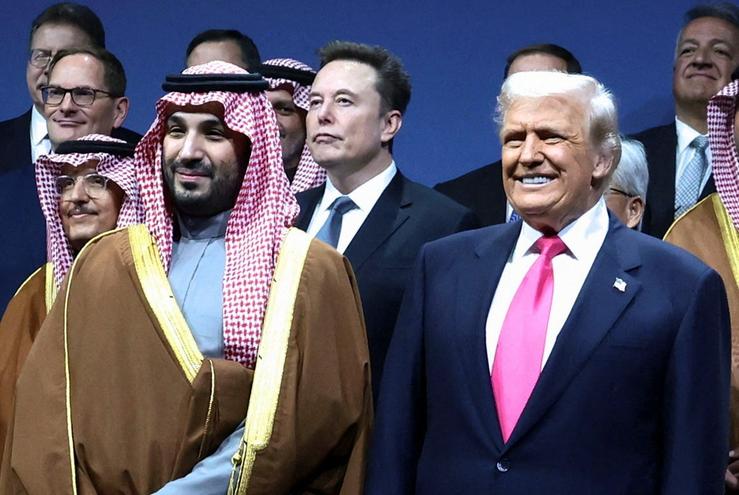The News
Saudi Crown Prince Mohammed bin Salman secured goodies he has been keen to get for a long time from US President Donald Trump. While details and timelines are vague, the kingdom said some $270 billion worth of agreements were signed during an investment summit in Washington this week, and Saudi’s military expects to get F-35s, the world’s most advanced fighter jet, plus nearly 300 tanks.
In a somewhat related move, MP Materials — which counts the US government as a shareholder — signed a deal with Saudi government-controlled Ma’aden to develop a rare earths refinery in the kingdom. The facility is expected to produce permanent magnets, a crucial material in modern defense systems like missiles and drones, supply of which had been wrapped up by China.
Aramco, meanwhile, inked agreements worth $30 billion, including stakes in two US liquefied natural gas projects. The company aims to expand gas production and trading as demand for the fuel rises.
In this article:
Know More
For what concerns AI, Saudi state-backed company HUMAIN received approval to buy 35,000 cutting-edge Nvidia Blackwell chips, crucial to its ambition to make the kingdom the world’s third biggest AI player. The US Commerce Department said its approval for the advanced GB300 chips was based on “rigorous security and reporting requirements.” But the figure falls well short of HUMAIN’s overall ambitions.
This week, HUMAIN secured deals with some of the biggest names in AI: Amazon Web Services plans to deploy 150,000 chips for a data center in Riyadh, Elon Musk’s xAI is partnering in a 500MW facility, and Cisco may build up to 1GW of capacity in the country. The Saudi company also led a $900 million funding round in media production startup Luma AI, with which it’s building a 2GW data center. As a result, HUMAIN wants to deploy up to 600,000 Nvidia GPUs in Saudi Arabia and the US over the next three years.
Matthew’s view
While details of the deals between the US and Saudi are still vague in places, Prince Mohammed returns home having secured a defense pact, a nuclear agreement, US help to become a critical minerals hub, and access to American technology.
All of that is a boon to his vision to secure stability in the Gulf region and accelerate the diversification of the Saudi economy. Call it a “Saudi First” push.
What was largely absent from the occasion were big Saudi commitments to buy US assets. Instead, most of the focus was on the kingdom acquiring US goods and services it can use back home for the crown prince’s domestic agenda. That was also evident in the kingdom’s sovereign wealth fund trimming back US stock holdings. While Riyadh will still take some big swings, it’s unlikely to be doing much stockpicking in future.
That’s a reflection of a Saudi focus on shorter-term wins, a recognition that even the kingdom’s vast oil wealth has limits, and a shift away from some of its most audacious announcements.
Saudi’s US investments probably won’t all add up to the $1 trillion promised, but the Washington visit has cemented Prince Mohammed’s role on the global stage and as an American ally. That, in turn, can help fuel his diversification and regional security agenda.
Notable
- Saudi Arabia’s sovereign wealth fund is mostly illiquid assets, many connected to its domestic economic development plan, leaving little cash to deploy abroad, Rob Copeland and Vivian Nereim report in The New York Times.
- Mohammed bin Salman’s arc from a pariah in the West to, in Trump’s words, “a very good friend” is explored in an interview between The New Yorker’s Isaac Chotiner and F. Gregory Gause, an author of multiple books on Saudi Arabia and a visiting scholar at the Middle East Institute in Washington, DC.



